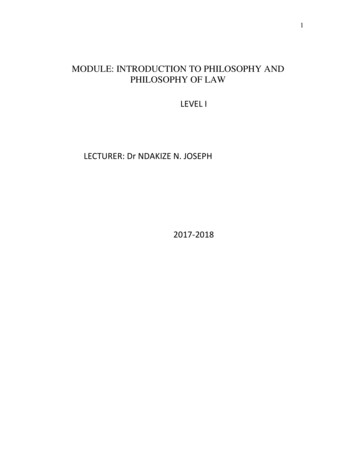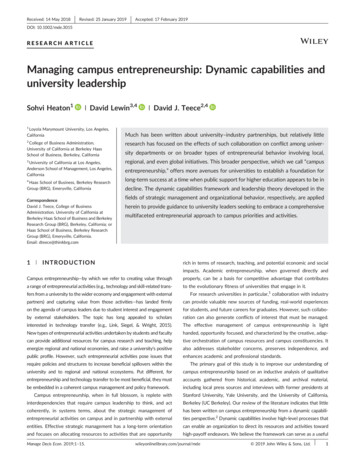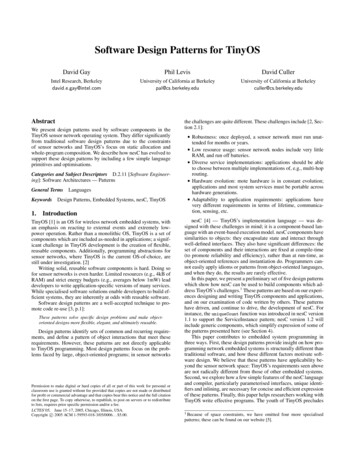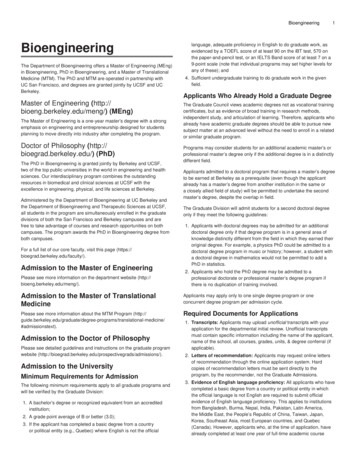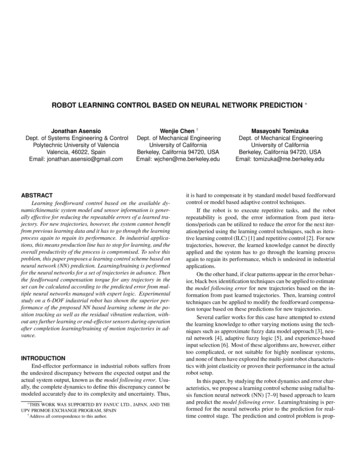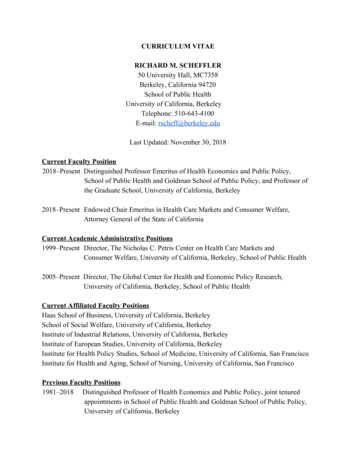
Transcription
PhilosophyPhilosophyEthicsSelect one of the following:PHILOS 104Bachelor of Arts (BA)PHILOS 106The Department of Philosophy offers an undergraduate major inPhilosophy leading to the Bachelor of Arts (BA) degree.Declaring the MajorGo to 314 Moses Hall (Philosophy Department office). Fill out aDeclaration of Major form. Submit to the Student Affairs Officer in 314Moses.Ethical Theories [4]Bioethics: Clinical and Population-LevelPHILOS 107Moral Psychology [4]PHILOS 108Contemporary Ethical Issues [4]PHILOS 114History of Political Philosophy [4]PHILOS 115Political Philosophy [4]Select one course numbered between PHILOS 160-PHILOS 178.Select one course from advmajordeclaration.pdfPHILOS 18Confucius for Today [4]PHILOS 153Chinese Philosophy [4]PHILOS 154Arabic PhilosophyHonors ProgramPHILOS 155With the consent of the major advisor, a student with an overall 3.5grade-point average (GPA) or higher and a GPA of 3.7 or higher incourses in the major may apply for admission to the honors program.Students in this program must complete a graduate seminar in theDepartment of Philosophy and write an acceptable honors thesis, forwhich four units of credit will be given under PHILOS H195.PHILOS 156A Foundations of Analytic Philosophy: Frege [4]Minor ProgramTo declare the minor, students should contact phildept@berkeley.edu toobtain a minor completion form.In addition to the University, campus, and college requirements, listedon the College Requirements tab, students must fulfill the belowrequirements specific to their major program.General Guidelines2. No more than one upper division course may be used tosimultaneously fulfill requirements for a student's major and minorprograms with the exception of minors offered outside of the Collegeof Letters & Science.Medieval Philosophy [4]PHILOS 160Plato [4]PHILOS 161Aristotle [4]PHILOS 163Special Topics in Greek Philosophy [4]PHILOS 170Descartes [4]PHILOS 171Hobbes [4]PHILOS 172Spinoza [4]PHILOS 173Leibniz [4]PHILOS 176Hume [4]PHILOS 178Kant [4]PHILOS 181Hegel [4]PHILOS 183Schopenhauer and Nietzsche [4]PHILOS 184Nietzsche [4]PHILOS 185Heidegger [4]PHILOS 186B Later Wittgenstein [4]1. All courses taken to fulfill the major requirements below must betaken for graded credit, other than courses listed which are offered ona Pass/No Pass basis only. Other exceptions to this requirement arenoted as applicable.PHILOS 187Special Topics in the History of Philosophy [4]PHILOS 188Phenomenology [4]PHILOS N188 Phenomenology [4]Epistemology/MetaphysicsSelect two courses from different groups below.Group A:PHILOS 1223. A minimum grade point average (GPA) of 2.0 must be maintainedin both upper and lower division courses used to fulfill the majorrequirements.Theory of Knowledge [4]Group B:PHILOS 125Metaphysics [4]Group C:For information regarding residence requirements and unit requirements,please see the College Requirements tab.PHILOS 132Philosophy of Mind [4]PHILOS 136Philosophy of Perception [4]One of the following courses may be taken on a Pass/No Pass basis.Group D:Lower Division RequirementsPHILOS 133Philosophy of Language [4]PHILOS 134Form and Meaning [4]PHILOS 135Theory of Meaning [4]PHILOS 12AIntroduction to Logic4PHILOS 25AAncient Philosophy4PHILOS 25BModern Philosophy4Upper Division RequirementsElectivesThree courses total. Two must be upper division and one may be2,3either upper division or lower division.1MethodsPhilosophical Methods (or equivalent see footnote11 below)4HistoryForms are available in 314 Moses, but also online:PHILOS 10014You may satisfy this requirement without taking PHILOS 100 bypresenting evidence that you received an A or an A in at leasttwo out of the first three eligible philosophy courses that you4
2Philosophyhave taken at Berkeley. Here are the eligible philosophy courses:PHILOS 25A; PHILOS 25B; any upper division philosophy courseexcept PHILOS 140A or PHILOS 140B2One elective may be a course offered in another department, providedthe course is approved by the undergraduate adviser.3PHILOS H195, PHILOS 198, and PHILOS 199 do not count aselectives.Students who have a strong interest in an area of study outside theirmajor often decide to complete a minor program. These programshave set requirements and are noted officially on the transcript in thememoranda section, but they are not noted on diplomas.1. All minors must be declared no later than one semester before astudent's Expected Graduation Term (EGT). If the semester beforeEGT is fall or spring, the deadline is the last day of RRR week. Ifthe semester before EGT is summer, the deadline is the final Fridayof Summer Sessions. To declare a minor, contact the departmentadvisor for information on requirements, and the declaration process.2. All courses taken to fulfill the minor requirements below must betaken for graded credit.4. A minimum grade point average (GPA) of 2.0 is required for coursesused to fulfill the minor requirements.5. Courses used to fulfill the minor requirements may be appliedtoward the Seven-Course Breadth requirement for Letters & Sciencestudents.6. No more than one upper division course may be used tosimultaneously fulfill requirements for a student's major and minorprograms.Lower DivisionContemporary Ethical Issues [4]PHILOS 114History of Political Philosophy [4]PHILOS 115Political Philosophy [4]Epistemology/Metaphysics, select one of the following:PHILOS 122Theory of Knowledge [4]PHILOS 125Metaphysics [4]PHILOS 132Philosophy of Mind [4]Entry Level Writing (http://writing.berkeley.edu/node/78/)All students who will enter the University of California as freshmen mustdemonstrate their command of the English language by fulfilling theEntry Level Writing requirement. Fulfillment of this requirement is also aprerequisite to enrollment in all reading and composition courses at UCBerkeley.The American History and Institutions requirements are based on theprinciple that a US resident graduated from an American university,should have an understanding of the history and governmentalinstitutions of the United States.All undergraduate students at Cal need to take and pass this coursein order to graduate. The requirement offers an exciting intellectualenvironment centered on the study of race, ethnicity and culture of theUnited States. AC courses offer students opportunities to be part ofresearch-led, highly accomplished teaching environments, grappling withthe complexity of American Culture.4The Quantitative Reasoning requirement is designed to ensure thatstudents graduate with basic understanding and competency in math,statistics, or computer science. The requirement may be satisfied byexam or by taking an approved course.or PHILOS 25BModern PhilosophyMoral Psychology [4]University of California RequirementsQuantitative Reasoning irement/)Upper DivisionPHILOS 10812Undergraduate students must fulfill the following requirements in additionto those required by their major program.4HistoryPHILOS 107Electives: three additional upper division philosophy coursesCollege of Letters & Science Essential SkillsRequirementsRequirementsEthical Theories [4]Philosophy of Perception [4]American Cultures rses/)8. All minor requirements must be completed within the unit ceiling. (Forfurther information regarding the unit ceiling, please see the CollegeRequirements tab.)PHILOS 104Theory of Meaning [4]PHILOS 136Berkeley Campus Requirement7. All minor requirements must be completed prior to the last day offinals during the semester in which the student plans to graduate.Students who cannot finish all courses required for the minor by thattime should see a College of Letters & Science adviser.Ethics, select one of the following:Form and Meaning [4]PHILOS 135American History and American Institutions ns-requirement/)3. A minimum of three of the upper division courses taken to fulfill theminor requirements must be completed at UC Berkeley.Ancient PhilosophyPhilosophy of Language [4]PHILOS 134For detailed lists of courses that fulfill college requirements, pleasereview the College of Letters & Sciences schools/letters-science/) page in this Guide. ForCollege advising appointments, please visit the L&S Advising (https://lsadvising.berkeley.edu/home/) Pages.General GuidelinesPHILOS 25APHILOS 133Foreign Language nt/)4The Foreign Language requirement may be satisfied by demonstratingproficiency in reading comprehension, writing, and conversation in aforeign language equivalent to the second semester college level, eitherby passing an exam or by completing approved course work.
PhilosophyReading and Composition ment/)In order to provide a solid foundation in reading, writing, and criticalthinking the College requires two semesters of lower division work incomposition in sequence. Students must complete parts A & B readingand composition courses in sequential order by the end of their fourthsemester.College of Letters & Science 7 CourseBreadth RequirementsBreadth Requirements he undergraduate breadth requirements provide Berkeley students witha rich and varied educational experience outside of their major program.As the foundation of a liberal arts education, breadth courses givestudents a view into the intellectual life of the University while introducingthem to a multitude of perspectives and approaches to research andscholarship. Engaging students in new disciplines and with peers fromother majors, the breadth experience strengthens interdisciplinaryconnections and context that prepares Berkeley graduates to understandand solve the complex issues of their day.Unit Requirements 120 total units Of the 120 units, 36 must be upper division units Of the 36 upper division units, 6 must be taken in courses offeredoutside your major departmentResidence RequirementsFor units to be considered in "residence," you must be registered incourses on the Berkeley campus as a student in the College of Letters& Science. Most students automatically fulfill the residence requirementby attending classes here for four years. In general, there is no needto be concerned about this requirement, unless you go abroad for asemester or year or want to take courses at another institution or throughUC Extension during your senior year. In these cases, you should makean appointment to meet an adviser to determine how you can meet theSenior Residence Requirement.Note: Courses taken through UC Extension do not count towardresidence.Senior Residence RequirementAfter you become a senior (with 90 semester units earned toward yourBA degree), you must complete at least 24 of the remaining 30 units inresidence in at least two semesters. To count as residence, a semestermust consist of at least 6 passed units. Intercampus Visitor, EAP, and UCBerkeley-Washington Program (UCDC) units are excluded.You may use a Berkeley Summer Session to satisfy one semester of theSenior Residence requirement, provided that you successfully complete6 units of course work in the Summer Session and that you have beenenrolled previously in the college.Modified Senior Residence RequirementParticipants in the UC Education Abroad Program (EAP), BerkeleySummer Abroad, or the UC Berkeley Washington Program (UCDC)may meet a Modified Senior Residence requirement by completing 243(excluding EAP) of their final 60 semester units in residence. At least 12of these 24 units must be completed after you have completed 90 units.Upper Division Residence RequirementYou must complete in residence a minimum of 18 units of upperdivision courses (excluding UCEAP units), 12 of which must satisfy therequirements for your major.MissionThe Undergraduate Student Learning Initiative (USLI) is a campuswideproject that has been under development at Berkeley since Fall2007. This initiative is designed to promote and facilitate learning forundergraduates across campus. In connection with this initiative, thePhilosophy Department has articulated the following goals for ourundergraduate majors.The primary goal that we expect our undergraduate philosophy majorsto achieve is to become capable of engaging with the main topics andissues in contemporary academic philosophy and with the historicaltradition by which contemporary philosophy is informed. Students whograduate from our program should be able to think both analytically andcreatively about philosophical issues and texts. They should be able toanalyse and raise objections to philosophical views and arguments thatare presented to them, and to develop and defend their own views onphilosophical topics. They should be able to do this both in writing andin oral discussion with other students and with instructors. Achievingthese objectives requires that students acquire more general skills inwriting, reading, and oral argument: they need to be able to organize theirideas, express them clearly both in writing and in speaking, and constructplausible arguments in their defense.Learning Goals for the MajorThis primary goal includes the following more specific goals:1. A broad general understanding of the work of major figures in thehistory of philosophy, including Plato, Aristotle, Descartes, and Kant.2. A deeper and more detailed understanding of the work of at least twohistorically important philosophers.3. Familiarity with the most important topics in a range of areaswhich are typically regarded as lying at the center of contemporaryphilosophical thought, including metaphysics, theory of knowledge,philosophy of mind, and the philosophy of language.4. Familiarity with the most important topics in ethics and the relatedfield of political philosophy.5. Familiarity with formal logic, including both the ability to understandthe logical symbolism used in many contemporary philosophical texts,and to carry out logical proofs and derivations within a formal system.6. The general capacity to think analytically and creatively aboutphilosophical texts and issues.7. The general capacity to express philosophical ideas and defend themeffectively in argument, both in writing and orally.AssessmentStudents’ attainment of these goals is measured by assessment oftheir performance in the courses required for the major. All philosophyundergraduate courses, with the exception of those in logic, requirestudents to write several essays over the course of the semester; many ofthem also require a final exam where the questions also take the form ofshort philosophical essays. These essays are evaluated by the instructorwith an eye both to the student’s mastery of the specific subject matter
4Philosophycovered by the course, and to the student’s mastery of more generalskills in philosophical thinking and writing. A higher standard of thinkingand writing is required for upper division than for lower division courses.More ambitious students have the option of taking graduate seminars aselectives, where the standard for philosophical writing is higher still.In logic courses, students’ competence in formal logic is evaluatedthrough assessment of their performance in weekly problem sets andexaminations (typically including a midterm and a final).All of our courses, again with the exception of those in formal logic,require students to engage in oral philosophical discussion, typicallyduring sections taught by graduate student instructors. In many courses,students’ contributions to discussion are assessed as part of the overallassessment of their performance in the class. We recognize it as ashortcoming in our program, however, that our courses are often toolarge to allow much discussion, and as a result, we are not confidentthat all of our students do in fact become proficient in this aspect of theprimary goal of the program. We think it very important that students havethe opportunity to develop their skills in oral discussion of philosophicalissues, and we are hoping to be able to introduce as a requirement thatstudents take one undergraduate seminar which offers ample opportunityfor discussion with a faculty member and with their peers. So far, thesmall size of the faculty compared with the large size of enrollment inphilosophy classes has prevented us from doing this, but we hope thatfaculty size will increase to a degree that will make this change in theprogram feasible.CurriculumStudents are required to take 12 courses overall, including a number ofrequired courses; these required courses are selected and designed withreference to the specific goals from the numbered list above, as follows: Goal 1: PHILOS 25A and PHILOS 25B (both required) Goal 2: Courses in the 160-187 sequence (two of these required) Goal 3: PHILOS 122, PHILOS 125, PHILOS 131, PHILOS 132, andPHILOS 135 (two of these required) Goal 4: PHILOS 104, PHILOS 105, PHILOS 107, PHILOS 115 (oneof these required) Goal 5: PHILOS 12A (required)PHILOS R1B Reading and CompositionThrough Philosophy 4 UnitsTerms offered: Fall 2022, Spring 2022, Fall 2021Training in writing expository prose in conjunction with readingphilosophical texts. Satisfies the second half of the Reading andComposition requirement.Reading and Composition Through Philosophy: Read More [ ]Rules & RequirementsPrerequisites: R1A offered by any department, or an equivalent courseRequirements this course satisfies: Satisfies the second half of theReading and Composition requirementHours & FormatFall and/or spring: 15 weeks - 3 hours of lecture per weekAdditional DetailsSubject/Course Level: Philosophy/UndergraduateGrading/Final exam status: Alternative to final exam.Reading and Composition Through Philosophy: Read Less [-]PHILOS 2 Individual Morality and SocialJustice 4 UnitsTerms offered: Fall 2022, Summer 2022 First 6 Week Session, Spring2022Introduction to ethical and political philosophy.Individual Morality and Social Justice: Read More [ ]Hours & FormatFall and/or spring: 15 weeks - 3 hours of lecture and 1 hour ofdiscussion per weekSummer:6 weeks - 8 hours of lecture and 2 hours of discussion per week8 weeks - 6 hours of lecture and 1.5 hours of discussion per weekAdditional Details Goal 6: All of our courses, except for those in formal logicSubject/Course Level: Philosophy/Undergraduate Goal 7: All of our courses (except for those in formal logic), butespecially PHILOS 100, which is a dedicated course in philosophicalwritingGrading/Final exam status: Letter grade. Final exam required.The goals described in this statement will be communicated to ourundergraduate students by posting a prominent link to this statementon our department website, on the same page that is used to informstudents about the course requirements for the philosophy major.PhilosophyExpand all course descriptions [ ]Collapse all course descriptions [-]Individual Morality and Social Justice: Read Less [-]
PhilosophyPHILOS 3 The Nature of Mind 4 UnitsTerms offered: Fall 2022, Summer 2022 First 6 Week Session, Summer2022 Second 6 Week SessionIntroduction to the philosophy of mind. Topics to be considered mayinclude the relation between mind and body; the structure of action; thenature of desires and beliefs; the role of the unconscious.The Nature of Mind: Read More [ ]Hours & FormatFall and/or spring: 15 weeks - 3 hours of lecture and 1 hour ofdiscussion per weekSummer: 6 weeks - 8 hours of lecture and 2 hours of discussion perweekAdditional Details5PHILOS 6 Man, God, and Society in WesternLiterature 4 UnitsTerms offered: Summer 2021 Second 6 Week Session, Fall 2016, Fall2013Philosophical issues as expressed in poetry, drama, and the novel. Thiscourse will compare and contrast the Greek, Medieval, and modernworlds, as reflected in their greatest literature, with special emphasis onthe role of the community in reconciling conflicts between sub-groups insociety and the individual's ability to understand and control his own life.We will also follow man's realization that the changing answers to thesequestions are themselves self-interpretations.Man, God, and Society in Western Literature: Read More [ ]Hours & FormatFall and/or spring: 15 weeks - 3 hours of lecture and 1 hour ofdiscussion per weekSubject/Course Level: Philosophy/UndergraduateGrading/Final exam status: Letter grade. Final exam required.Summer: 6 weeks - 8 hours of lecture and 2 hours of discussion perweekThe Nature of Mind: Read Less [-]Additional DetailsPHILOS 4 Knowledge and Its Limits 4 UnitsSubject/Course Level: Philosophy/UndergraduateTerms offered: Summer 2021 Second 6 Week Session, Spring 2018,Spring 2016Introduction to the theory of knowledge.Knowledge and Its Limits: Read More [ ]Hours & FormatFall and/or spring: 15 weeks - 3 hours of lecture and 1 hour ofdiscussion per weekSummer: 6 weeks - 8 hours of lecture and 2 hours of discussion perweekAdditional DetailsSubject/Course Level: Philosophy/UndergraduateGrading/Final exam status: Letter grade. Final exam required.Knowledge and Its Limits: Read Less [-]PHILOS 5 Science and Human Understanding4 UnitsTerms offered: Fall 2020, Spring 2020, Fall 2018Introduction to the Philosophy of Science.Science and Human Understanding: Read More [ ]Hours & FormatFall and/or spring: 15 weeks - 3 hours of lecture and 1 hour ofdiscussion per weekSummer: 6 weeks - 7.5 hours of lecture per weekAdditional DetailsSubject/Course Level: Philosophy/UndergraduateGrading/Final exam status: Letter grade. Final exam required.Science and Human Understanding: Read Less [-]Grading/Final exam status: Letter grade. Final exam required.Man, God, and Society in Western Literature: Read Less [-]PHILOS 7 Existentialism in Literature andFilm 4 UnitsTerms offered: Spring 2022, Spring 2021, Fall 2015Christian, agnostic, and atheistic existentialism as expressed in the worksof Dostoyevsky, Melville, Kafka, Antonioni, Goddard, etc.Existentialism in Literature and Film: Read More [ ]Hours & FormatFall and/or spring: 15 weeks - 3 hours of lecture and 1 hour ofdiscussion per weekSummer:6 weeks - 7.5 hours of lecture and 2.5 hours of discussion per week8 weeks - 6 hours of lecture and 2 hours of discussion per weekAdditional DetailsSubject/Course Level: Philosophy/UndergraduateGrading/Final exam status: Letter grade. Final exam required.Existentialism in Literature and Film: Read Less [-]
6PhilosophyPHILOS 9 Introduction to FeministPhilosophy 4 UnitsPHILOS 11 Introduction to the Philosophy ofReligion 4 UnitsTerms offered: Summer 2022 Second 6 Week Session, Fall 1999,Summer 1996 10 Week SessionThis course is an introduction to key issues in feminist philosophy. Thefirst part of the course focuses on building up a toolbox of importantfeminist concepts. In the second unit of the course, we will considerseveral major approaches to thinking about sex- and gender-basedoppression. Finally, we will bring our knowledge of those approachesto bear on a number of special topics. Throughout the course, we willfocus on the ways in which questions about the nature, status, rights, andabilities of women intersect with questions about race, class, sexuality,coloniality, and disability.Introduction to Feminist Philosophy: Read More [ ]Hours & FormatTerms offered: Fall 2022, Fall 2019, Spring 2016A survey of basic issues in contemporary philosophy of religion, exploringarguments about God's existence, the status of religious experiences andbeliefs, how souls might interact with bodies, and the relationship of Godto morality.Introduction to the Philosophy of Religion: Read More [ ]Hours & FormatFall and/or spring: 15 weeks - 3 hours of lecture and 1 hour ofdiscussion per weekSummer: 6 weeks - 8 hours of lecture and 2 hours of discussion perweekFall and/or spring: 15 weeks - 3 hours of lecture and 1 hour ofdiscussion per weekSummer: 6 weeks - 7.5 hours of lecture and 2.5 hours of discussion perweekAdditional DetailsSubject/Course Level: Philosophy/UndergraduateGrading/Final exam status: Letter grade. Final exam required.Introduction to the Philosophy of Religion: Read Less [-]Additional DetailsSubject/Course Level: Philosophy/UndergraduateGrading/Final exam status: Letter grade. Final exam required.Formerly known as: Philosophy 09PHILOS 12A Introduction to Logic 4 UnitsTerms offered: Fall 2022, Summer 2022 First 6 Week Session, Summer2022 Second 6 Week SessionSyntax, semantics, and proof theory of sentential and predicate logic.Introduction to Logic: Read More [ ]Rules & RequirementsIntroduction to Feminist Philosophy: Read Less [-]PHILOS 10 Comparative Ethics 4 UnitsTerms offered: Fall 2015A comparative study of topics in Chinese and Western ethical traditions.Topics include love, compassion, benevolence; rituals, filial obligations,the individual and the family; pride, shame, guilt; conscientiousness,courage, wisdom; trustworthiness, forms of integrity; concepts of theself; self-cultivation; human nature, destiny, the cosmic order; theconcept of morality, morality and tradition. The course will concludewith a discussion of metaethical issues concerning the confrontationbetween rival ethical traditions and methodological issues in the study ofcomparative ethics.Comparative Ethics: Read More [ ]Hours & FormatCredit Restrictions: Students can remove a deficient grade inPHILOS 12A by passing PHILOS W12A. Students who passPHILOS W12A receive no credit for passing PHILOS 12A.Hours & FormatFall and/or spring: 15 weeks - 3 hours of lecture and 2 hours ofdiscussion per weekSummer: 6 weeks - 7.5 hours of lecture and 5 hours of discussion perweekAdditional DetailsSubject/Course Level: Philosophy/UndergraduateFall and/or spring: 15 weeks - 3 hours of lecture per weekGrading/Final exam status: Letter grade. Final exam required.Additional DetailsIntroduction to Logic: Read Less [-]Subject/Course Level: Philosophy/UndergraduateGrading/Final exam status: Letter grade. Final exam required.Instructor: ShunComparative Ethics: Read Less [-]
PhilosophyPHILOS W12A Introduction to Logic 4 UnitsTerms offered: Summer 2022 8 Week Session, Summer 2021 8 WeekSession, Summer 2020 8 Week SessionIntended as a first course in logic for students with no previousexposure to the subject, the course treats symbolic logic. Studentswill learn to formalize reasoning in symbolic languages with preciselydefined meanings and rules of inference. Symbolic logic is by naturea mathematical subject, but the course does not presuppose anyprior coursework in mathematics—only an openness to mathematicalreasoning.The course concentrates on three systems of symbolic logic:propositional logic (or sentential logic); syllogistic logic; and predicatelogic (or first-order logic). Students from philosophy, mathematics,computer science, and linguistics will find important connections betweensymbolic logic and their other coursework.Introduction to Logic: Read More [ ]Rules & RequirementsCredit Restrictions: Students can remove a deficient grade inPHILOS W12A by passing PHILOS 12A. Students who passPHILOS 12A receive no credit for passing PHILOS W12A.Hours & FormatSummer: 8 weeks - 6 hours of web-based lecture and 4 hours of webbased discussion per week7PHILOS 14 Philosophy of ArtificialIntelligence 4 UnitsTerms offered: Not yet offeredA tour of metaphysical, epistemological, and ethical issues raised by AIexamining questions like: What is intelligence? What is agency? How dowe know if machines have either of these? What’s the difference betweenan AI making predictions, yielding explanations, and understanding?What exactly would it take for a machine to understand natural languageas human beings do? On the ethical side, questions like: If an algorithmmanifests biased behavior, whose fault is it? How applications of AIthreaten privacy or manipulate? Do basic questions of morality need tobe settled so that we can program autonomous robots and vehicles?Finally, we consider if a superintelligent AI is a thing to look forward to, agrave threat, or a sci-fi fantasy.Philosophy of Artificial Intelligence: Read More [ ]Hours & FormatFall and/or spring: 15 weeks - 3 hours of lecture and 1 hour ofdiscussion per weekSummer:6 weeks - 8 hours of lecture and 2 hours of discussion per week8 weeks - 6 hours of lecture and 1.5 hours of discussion per weekAdditional DetailsSubject/Course Level: Philosophy/UndergraduateOnline: This is an online course.Grading/Final exam status: Letter grade. Final exam required.Additional DetailsPhilosophy of Artificial Intelligence: Read Less [-]Subject/Course Level: Philosophy/UndergraduateGrading/Final exam status: Letter grade. Final exam required.Instructor: HollidayIntroduction to Logic: Read Less [-]PHILOS 13 Business Ethics 3 UnitsTerms offered: Summer 1997 10 Week SessionThis course addresses the nature of ethical motivation and agency,with special attention to the individual's role in a business organization.Topics include theories of ethical motivation; individual character andorganizational culture; personal integrity; corporate agency; corporateresponsibility to society.Business Ethics: Read More [ ]Hours & FormatPHILOS 16 Introduction to Metaphysics 3UnitsTerms offered: Summer 2002 10 Week Session, Summer 2001 10 WeekSession, Summer 2000 10 Week SessionThis course is an introduction to some of the traditional questions inmetaphysics--the study of what there is in the world and how what thereis is structured. Topics will include free will and determinism, the mindbody problem, and personal identity. If time permits, we will also examinearguments for the existence of God.Introduction to Metaphysics: Read More [ ]Hours & FormatSu
Philosophy 1 Philosophy Bachelor of Arts (BA) The Department of Philosophy offers an undergraduate major in Philosophy leading to the Bachelor of Arts (BA) degree.
